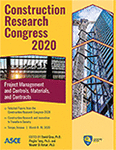Construction Research Congress 2020
Management Reserve Estimation Model for Real Estate Development Projects
Publication: Construction Research Congress 2020: Project Management and Controls, Materials, and Contracts
ABSTRACT
The increasing competition in the real estate market nowadays forces real estate developers to exert great efforts to maximize their market share. Accordingly to maintain their competitiveness, accurate estimation of the total project budget is necessary including both contingency reserve (CR) and management reserve (MR). CR is often used to cover known-unknown risk events that can occur in a given project, while MR is often used to cover unknown-unknown risk events. Many research efforts tackled CR estimation, yet there is a lack of efforts that have addressed MR estimation. Overestimating MR increases the total project budget, and thus increases the chances of rejecting the project due to its infeasibility, which subsequently leads to losing investment opportunities. On the other hand, underestimating MR may mislead the organization to proceed towards a false investment causing budgeting problems. This is due to the absence of a proper estimation method for MR. Accordingly, this research proposes a new management reserve estimation (MRE) model to compute near-actual MR amount, considering the uncertainties associated with its estimation. The MRE model consists of three modules: 1) risk identification, 2) risk uncertainty treatment using a hybrid system that combines fuzzy logic and Monte Carlo simulation techniques, and 3) MR quantification using an integration of Monte Carlo simulation and the expected monetary value. The model has been validated using a real estate development project. In essence, the proposed model addresses the shortage in MR estimation, helps policy makers in the real estate development sector take correct investment decisions, and minimizes the chance of incurring financial losses.
Get full access to this article
View all available purchase options and get full access to this chapter.
REFERENCES
Abdelgawad, M. and Fayek, A. R. (2012). “Comprehensive Hybrid Framework for Risk Analysis in the Construction Industry Using Combined Failure Mode and Effect Analysis, Fault Trees, Event Trees, and Fuzzy Logic.” J. of Constr. Eng. and Manage., 138(5), 642 – 657.
Barraza, G. A., and Bueno, R. A. (2007). “Cost Contingency Management.” J. of Manage. in Eng., 23(3), 140 – 146.
Bojadziev, G., and Bojadziev, M. (1997). Fuzzy Logic for Business, Finance and Management, 2nd edition. Singapore: World Scientific Publishing.
Central Bank of Egypt. (2017). “Annual Report of Central Bank of Egypt 2016/2017.” <https://www.cbe.org.eg>, (August, 1st, 2019)
Christensen, D. S., & Templin, C. (2000). “An Analysis of Management Reserve Budget on Defense Acquisition Contracts.” Proceedings of the 9th Annual Conf. on the Society of Cost Estimating and Analysis, Manhattan Beach, CA.
Eldosouky, I. A., Ibrahim, A. H., and Mohammed, H. E. D. (2014). “Management of construction cost contingency covering upside and downside risks.” Alexandria Eng. J., 53(4), 863–881.
Idrus, A. Nuruddin, M. F., and Rohman, M. A. (2011). “Development of project cost contingency estimation model using risk analysis and fuzzy expert system.” Expert Systems with Applications, 38, 1501–1508.
Lee, K, Lee, H., Park, M., Kim, D.; and Jung, M. (2017). “Management-Reserve Estimation for International Construction Projects Based on Risk-Informed k-NN.” J. of Manage. in Eng., 33(4).
Mohamed, D., Srour, F., Tabra, W. and Zayed, T. (2009). “A Prediction Model for Construction Project Time Contingency.” Construction Research Congress, Seattle, WA, 736-745.
PMO. (2015). PMO Handbook. Ireland: Trinity College Dublin, University of Dublin.
Shin, Y. C., & Xu, C. (2009). Intelligent Systems: Modeling, Optimization, and Control. US: CRC Press.
Sadeghi, N., Fayek, A.R. and Pedrycz, W. (2010). “Fuzzy monte carlo simulation and risk assessment in construction.” Comp.-Aided Civil and Infra. Eng., 25(4), 238-252.
Salah, A. and Moselhi, O. (2015),"Contingency modelling for construction projects using fuzzy-set theory." Eng., Constr. and Arch. Manage., 22(2), 214 – 241.
Shaheen, A. A., Fayek, A. R., and AbouRizk, S. M. (2007). “Fuzzy Numbers in Cost Range Estimating.” J. of Constr. Eng. and Manage., 133(4), 325–334.
Thal, A. E. Jr., Cook, J. J., and White, E. D. III. (2010). “Estimation of cost contingency for air force construction projects.” J. Constr. Eng. Manage., 1181–1188.
Information & Authors
Information
Published In
Construction Research Congress 2020: Project Management and Controls, Materials, and Contracts
Pages: 1101 - 1110
Editors: David Grau, Ph.D., Arizona State University, Pingbo Tang, Ph.D., Arizona State University, and Mounir El Asmar, Ph.D., Arizona State University
ISBN (Online): 978-0-7844-8288-9
Copyright
© 2020 American Society of Civil Engineers.
History
Published online: Nov 9, 2020
Published in print: Nov 9, 2020
Authors
Metrics & Citations
Metrics
Citations
Download citation
If you have the appropriate software installed, you can download article citation data to the citation manager of your choice. Simply select your manager software from the list below and click Download.
